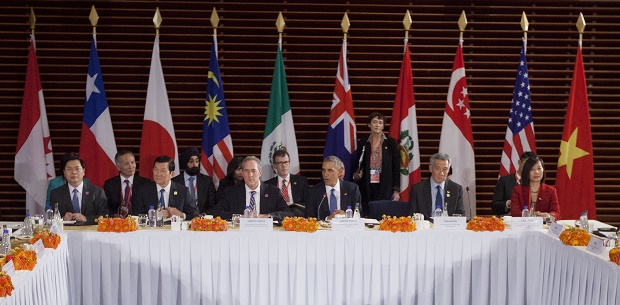United States, 11 Pacific Rim countries reach trade deal

In this Nov. 10, 2014 file photo, US President Barack Obama, center, speaks during his meeting with leaders of the Trans-Pacific Partnership countries, in Beijing. Sitting with Obama are, from left, Vietnam Minister of Industry and Trade Vu Hoy Hoang, Vietnam Prime Minister Nguyen Tan Dung, U.S. Trade Representative Ambassador Mike Froman, Singapore Prime Minister Lee Hsien Loong, and Singapore Sec. of Ministry of Trade and Industry Ow Foong Pheng. The United States and 11 other Pacific Rim countries on Monday, Oct. 5, 2015, agreed to the Trans-Pacific Partnership, an ambitious and controversial trade pact that cuts trade barriers, sets labor and environmental standards and protects multinational corporations’ intellectual property. AP Photo
WASHINGTON, United States—Having hammered out an ambitious trade deal with 11 Pacific Rim countries, the Barack Obama administration now faces a potentially tougher task: selling the deal to a skeptical Congress.
The countries reached a contentious trade pact Monday that cuts trade barriers, sets labor and environmental standards and protects multinational corporations’ intellectual property after marathon negotiating sessions in Atlanta through the weekend.
The Trans-Pacific Partnership is designed to encourage trade between the United States, Australia, Brunei, Canada, Chile, Japan, Malaysia, Mexico, New Zealand, Peru, Singapore and Vietnam. Together, the countries account for 40 percent of world economic output.
“We think it helps define the rules of the road for the Asia-Pacific region,” said US Trade Rep. Michael Froman.
For President Barack Obama, the trade deal is a major victory on a centerpiece of his international agenda.
Article continues after this advertisementObama has pursued the pact against the objections of many lawmakers in his own Democratic Party and instead forged rare consensus with Republicans.
Article continues after this advertisementTrade unions and other critics say the deal will expose American workers to foreign competition and cost jobs. Given the opposition, the pact’s “fate in Congress is at best uncertain,” said Lori Wallach, a leading TPP critic and director of Public Citizen’s Global Trade Watch.
Obama has cast the agreement as good for Americans workers and crucial to countering China and expanding US influence in the Asia-Pacific.
“This partnership levels the playing field for our farmers, ranchers, and manufacturers by eliminating more than 18,000 taxes that various countries put on our products,” Obama said in a statement. “It includes the strongest commitments on labor and the environment of any trade agreement in history, and those commitments are enforceable, unlike in past agreements.”
The president has to wait 90 days before signing the pact, and only then will Congress begin the process of voting on it.
As a result, a vote on the TPP likely will not happen until well into 2016, where it is likely to get ensnarled in the politics of a presidential election year. Congress can only give the deal an up-or-down vote. It can’t amend the agreement.
Many of the tariff reductions and other changes will be phased in over several years, so benefits to the US economy could take time to materialize.
Peter Petri, a professor of international finance at Brandeis University, says he doesn’t expect the deal to lead to any US job gains. But he forecasts it will boost US incomes by $77 billion a year, or 0.4 percent, by 2025, mostly by creating export-oriented jobs that will pay more, even as other jobs are lost.
Another target for opponents was drug companies’ efforts to protect some of their products from cheaper foreign competition.
US drug makers wanted 12 years of protection from competitors for biologics—ultra-expensive medicines produced in living cells. That is longer than in any country but the United States. Critics say blocking competition from near-copies drives up drug prices and makes them too expensive for people in poor countries.
Drug companies didn’t get the dozen years they wanted; they got about eight years of protection.
Judit Rius Sanjuan, legal policy adviser to Doctors Without Borders, said in a statement that “TPP will still go down in history as the worst trade agreement for access to medicines in developing countries, which will be forced to change their laws to incorporate abusive intellectual property protections for pharmaceutical companies.”
Critics also worried that the deal would enable multinational companies to challenge different countries’ laws and regulations in private tribunals on the grounds they inhibit trade, undermining local laws on public health and the environment. But in a statement Monday, the trade ministers in Atlanta said the TPP has safeguards that prevent “abusive and frivolous claims and ensure the right of governments to regulate in the public interest, including on health, safety, and environmental protection.”
Late last month, 160 members of Congress wrote Obama urging that the TPP include measures to stop countries from manipulating their currencies to give their exporters a price advantage. The final pact, however, doesn’t include provisions on currency.
The US Treasury Department said Monday that the countries will continue to separately work together “strengthen macroeconomic cooperation, including on exchange rate issues.”
RELATED STORIES
Manila a step closer to sealing int’l trade pact